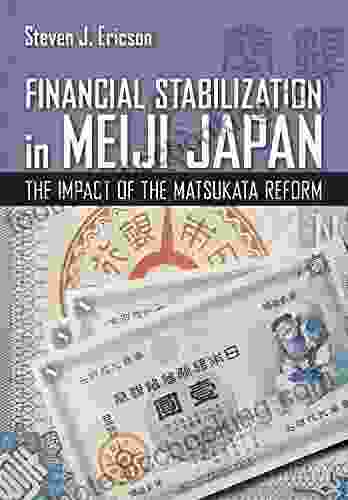Financial Stabilization in Meiji Japan: A Journey Through Economic Transformation

4.5 out of 5
| Language | : | English |
| File size | : | 4249 KB |
| Text-to-Speech | : | Enabled |
| Screen Reader | : | Supported |
| Enhanced typesetting | : | Enabled |
| Print length | : | 204 pages |
The Meiji Restoration of 1868 marked a pivotal moment in Japan's history, heralding an era of profound transformation and modernization. Amidst this sweeping change, the financial sphere underwent a remarkable journey towards stabilization and the establishment of modern finance. This article delves into the intricate details and lasting significance of Meiji Japan's financial stabilization, shedding light on the innovative policies, fiscal reforms, and emergence of modern financial institutions that shaped this transformative era.
Laying the Foundation: The Pre-Restoration Era
Prior to the Meiji Restoration, Japan's financial system was characterized by fragmentation and instability. A multitude of local currencies and a decentralized banking system hindered economic growth and hampered the government's ability to effectively manage its finances. This lack of financial cohesion posed significant challenges to the newly established Meiji government as it sought to embark on an ambitious modernization program.
Innovative Policies and Fiscal Reforms
Recognizing the critical importance of a stable financial system, the Meiji government embarked on a comprehensive program of reforms designed to create a unified and modern monetary system. Central to these efforts was the of a new national currency, the yen, in 1871. The standardization of currency brought much-needed Free Download to the chaotic financial landscape and facilitated trade and commerce across Japan.
Alongside currency reform, the government implemented a series of fiscal reforms aimed at balancing the budget and stabilizing the economy. These measures included the implementation of a modern tax system, the establishment of a central bank, and the consolidation of government debt. The creation of the Bank of Japan in 1882 played a pivotal role in regulating the money supply, managing interest rates, and fostering the development of a modern banking system.
The Emergence of Modern Finance
As the Meiji era progressed, Japan witnessed the rapid expansion of modern financial institutions and practices. The establishment of stock exchanges in Tokyo and Osaka facilitated the mobilization of capital for industrial development and innovation. The emergence of insurance companies and other financial intermediaries provided essential risk management tools and contributed to the growth of a diversified financial sector.
International trade and foreign investment played a significant role in Japan's financial stabilization. The Meiji government actively sought to attract foreign capital and encouraged the influx of Western financial expertise. These external influences helped shape Japan's banking system, corporate governance practices, and accounting standards, fostering a more modern and internationally integrated financial landscape.
Challenges and Triumphs: The Road to Stabilization
The path towards financial stabilization in Meiji Japan was not without its challenges. Economic crises, such as the Panic of 1873, tested the resilience of the newly established financial system. However, the government's steadfast commitment to sound fiscal policies and the ongoing development of modern financial institutions helped Japan navigate these storms.
By the end of the Meiji era in 1912, Japan had achieved remarkable progress in its quest for financial stability. The establishment of a unified currency, the implementation of fiscal reforms, and the emergence of modern financial institutions laid the foundation for a robust and increasingly integrated financial system. This stability served as a bedrock for Japan's subsequent economic growth and industrialization.
Legacy and Historical Significance
The financial stabilization achieved during the Meiji era had a profound impact on Japan's economic development in the 20th century. The establishment of a modern financial system provided a stable environment for investment, innovation, and international trade. The lessons learned during this period continue to inform Japan's financial policies and shape its role in the global economy.
Beyond Japan's bFree Downloads, the Meiji era's financial transformation serves as a historical case study for developing nations seeking to stabilize their economies and achieve sustainable growth. The innovative policies and reforms implemented during this period offer valuable insights into the challenges and opportunities associated with financial modernization.
The financial stabilization of Meiji Japan stands as a testament to the transformative power of sound economic policies and the importance of a modern and stable financial system. Through a combination of innovative reforms, fiscal discipline, and the embrace of modern finance, Japan laid the foundation for its subsequent economic success and established itself as a major player in the global economy. The lessons learned during this remarkable period continue to resonate today, providing valuable guidance for nations seeking to achieve financial stability and sustainable economic growth.
4.5 out of 5
| Language | : | English |
| File size | : | 4249 KB |
| Text-to-Speech | : | Enabled |
| Screen Reader | : | Supported |
| Enhanced typesetting | : | Enabled |
| Print length | : | 204 pages |
Do you want to contribute by writing guest posts on this blog?
Please contact us and send us a resume of previous articles that you have written.
 Book
Book Novel
Novel Page
Page Chapter
Chapter Text
Text Story
Story Genre
Genre Reader
Reader Library
Library Paperback
Paperback E-book
E-book Magazine
Magazine Newspaper
Newspaper Paragraph
Paragraph Sentence
Sentence Bookmark
Bookmark Shelf
Shelf Glossary
Glossary Bibliography
Bibliography Foreword
Foreword Preface
Preface Synopsis
Synopsis Annotation
Annotation Footnote
Footnote Manuscript
Manuscript Scroll
Scroll Codex
Codex Tome
Tome Bestseller
Bestseller Classics
Classics Library card
Library card Narrative
Narrative Biography
Biography Autobiography
Autobiography Memoir
Memoir Reference
Reference Encyclopedia
Encyclopedia Franklin Horton
Franklin Horton Frank Mares
Frank Mares Francine Jay
Francine Jay Mohammed Hamed Ahmed Soliman
Mohammed Hamed Ahmed Soliman Frederick D Patterson
Frederick D Patterson Ford R Bryan
Ford R Bryan Frank M Snowden
Frank M Snowden Ruhi Choudhary
Ruhi Choudhary Francis Parkman
Francis Parkman Henry Walter Bates
Henry Walter Bates Fred G Baker
Fred G Baker Nicole Martin
Nicole Martin Stanley Meisler
Stanley Meisler Leslie Anthony
Leslie Anthony Judy Andrekson
Judy Andrekson Joanie Chevalier
Joanie Chevalier Fred Mcallen
Fred Mcallen Geronimo
Geronimo Jeffery Deaver
Jeffery Deaver James G Greenlee
James G Greenlee
Light bulbAdvertise smarter! Our strategic ad space ensures maximum exposure. Reserve your spot today!
 Thomas PynchonFollow ·13.3k
Thomas PynchonFollow ·13.3k Alex ReedFollow ·6.1k
Alex ReedFollow ·6.1k Thomas HardyFollow ·12.6k
Thomas HardyFollow ·12.6k Fernando PessoaFollow ·7.7k
Fernando PessoaFollow ·7.7k Esteban CoxFollow ·3.8k
Esteban CoxFollow ·3.8k Dalton FosterFollow ·16.9k
Dalton FosterFollow ·16.9k Bryson HayesFollow ·6.3k
Bryson HayesFollow ·6.3k Tim ReedFollow ·6k
Tim ReedFollow ·6k

 Howard Blair
Howard BlairHeroes and Villains from American History: The Biography...
David Dixon...

 Felipe Blair
Felipe BlairAn Informal History of the 1920s: Uncovering the Roaring...
The 1920s, an era...

 Howard Blair
Howard BlairHow a Peculiar Victorian Zookeeper Waged a Lonely Crusade...
In the enigmatic world of Victorian...

 Harold Powell
Harold PowellMemoir of Food, Wine, and Love in Italy: A Culinary...
Prepare your senses...
4.5 out of 5
| Language | : | English |
| File size | : | 4249 KB |
| Text-to-Speech | : | Enabled |
| Screen Reader | : | Supported |
| Enhanced typesetting | : | Enabled |
| Print length | : | 204 pages |
















